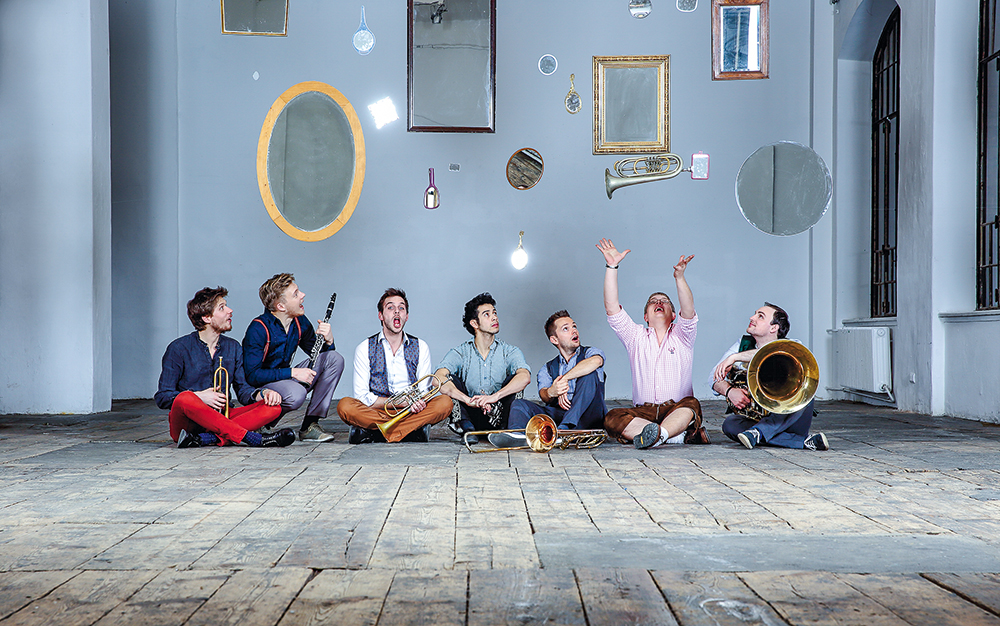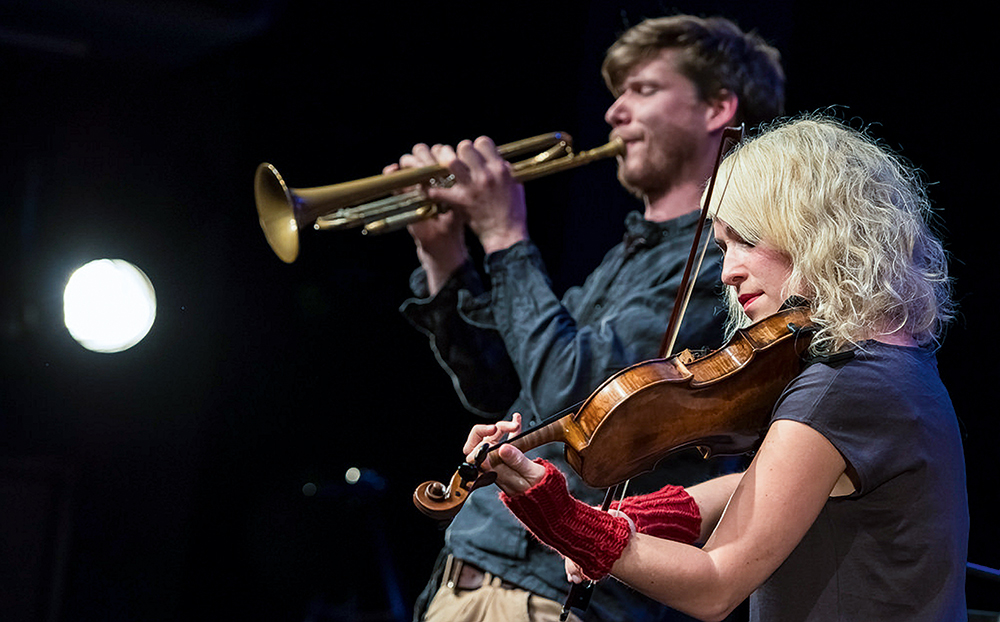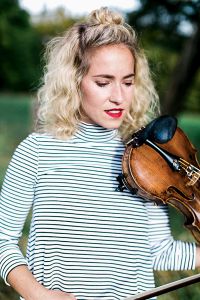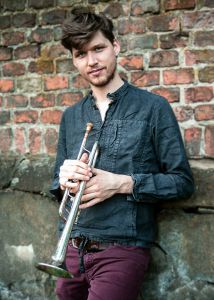They’re a couple in their private lives, they appear as the duo Ramsch & Roses, and from summer 2018 they’ll be assuming artistic directorship of the wellenklaenge-Festival in Lunz am See: former mdw students Julia Lacherstorfer and Simon Zöchbauer tell mdw Magazine how it is living as a musiciancouple at the edge of Vienna and why they often have to deliberately make time for their private life together—and they also show how two creative personalities need not be one too many.
Take any two talents in a couple / no matter how great they are / they annihilate each other / first one of them annihilates the other / and then vice-versa / Either the wife acquiesces / or she is annihilated / Or the husband acquiesces / or he is annihilated / in every case both spouses are annihilated […] The artist has to stand alone / against the whole world / to be a solitary figure / standing against everyone and everything”, wrote a critical Thomas Bernhard in his 1976 play Die Berühmten about relationships between men and women in the arts world. An incomparably lively example fit to convince us of the contrary is that of Julia Lacherstorfer and Simon Zöchbauer. They first became acquainted at a festival in South Tirol in 2010, and they’ve now been a couple for five years. The Upper Austrian Julia Lacherstorfer—a violinist, singer, and composer—is active above all with her band ALMA, and she also gives numerous workshops on folk music, improvisation, and yodelling. For his part, Herzogenburg-native Simon Zöchbauer—a trumpeter, composer, improviser, singer, and zither player—shines on stage with his wind formation Federspiel. The two live together in a small Scandinavian-looking house at the edge of Vienna, still urban but with nature all around. A deliberately chosen, quiet location—and though both of them often work there, it’s still a great place to wind down. That’s a difficult balancing act that doesn’t always succeed, for it’s rarely the case that one week is like the next: the two switch between projects, and one or both is sometimes on tour, sometimes in Vienna for an extended period.

“We occasionally have to be really careful to avoid talking about dates or the festival immediately after waking up. It’s a challenge, because there’s nobody telling us how our professional structure should look. We have different responsibilities— as musicians, festival heads, and band members—and there are no guidelines on how we should do what. Every week is different, as is every tour…”, says Lacherstorfer. “It takes a whole lot of organisation and ‘consciously taking time’ for important things—in both directions—professionally and privately. It’s often not clear if the other one of us is okay talking about professional stuff at a given time. And this sometimes causes us to cross lines—or maybe one of us gets overwhelmed. The more you accept the boundaries of the other person, the better it is for the relationship in the long term,” adds Zöchbauer. They first had to develop a feel for it all (“especially in our early days together, we had to do a lot of exploring”) and develop strategies for switching between their two modes—professional and private. Especially because these boundaries often aren’t so clear: their duo project Ramsch & Roses, in which they’re fond of digging up beautiful old pieces and also making “contemporary folk music”, arises in part from the couple’s affinity for singing together—“a very romantic thing to do,” says Zöchbauer. And sometimes, concertgoers do indeed ask if the two are a couple privately, as well—because it’s something that people do notice, he says.
They enjoy the fact that lots of nice moments arise automatically when they give concerts and/ or go on tour together. “We can share so much and we can compare notes and back each other up—including in artistic things,“ says the young trumpeter. Feedback on new pieces, for example, can be very helpful: “He gives me feedback that’s totally on point and just really helps me,” says Lacherstorfer. “I can’t imagine how it would be if I couldn’t share what I do like I do with my partner, or if he weren’t able to connect with it,” she says. And Zöchbauer continues: “It’s a kind of fine-tuning to get a sense of yourself and your partner, and what you or your partner needs at the moment. Critical feedback, or just affirmation? That’s constantly changing—you can’t go according to some programme,” is his conviction. What one of them is on tour alone, that’s ok, too—it gives them more time for themselves.

One partner’s success is celebrated by both and, if anything, provides motivation to work even more on one’s own self. “I don’t feel jealous. I’m happy, for instance, when ALMA wins a prize. I might ask myself why they got the prize and we didn’t, and what we can do about that, but that’s far from jealousy. I think the moment you get jealous is when you see something someone else has developed that you’d absolutely need for your own artistic progress, where you just aren’t that far yet,” he explains. Julia Lacherstorfer agrees: “Jealousy comes perhaps from a certain unfulfilled feeling.”
There are no established practicing hours at home, because those wouldn’t always work in everyday life. But after 10 p.m., they do try to really call it a day: “Especially just for our own selves, because if you’re trying to relax and the other is still in work mode and practicing, and you hear it, it’s kind of hard to truly relax,” explains Zöchbauer. Their three-storey house is a big help, here, because that gives each of them their own work area. And if they notice at some point that they’re missing their time together, then they arrange a regular ritual where they deliberately schedule something nice—like a long walk or a meal together.“

As a couple, they think little of the clichés associated with an artist’s life. They quickly dispel the idea that, with musicians, two big egos come together: “Artistic work and big egos don’t necessarily go together well. Too much of an ego is helpful neither professionally nor privately,” says Zöchbauer. “I think that the job we do is often a lot tougher than one would think, particularly when both of us work in a field where it’s about one’s own creative output,” says Lacherstorfer.
The two view their division of roles and their relationship as being pretty balanced. And that’s also a subject when it comes to thinking about possible family planning: “The fact that, as a woman, you might have to or even want to pull back for a certain period of time, is—up to a certain point—a matter of biology and very dependent on your own personality and your partner. Reconciling children with the life we currently lead would certainly be a challenge, but I just believe that it’s an advantage, living as freelancers, that—if we someday have kids—we’ll be able to arrange things much more flexibly. We’re also both with the same agency—which makes it easier for us to coordinate our touring,” adds an optimistic Lacherstorfer.

Both their lives are thoroughly steeped in music—although it isn’t the case that, at every private party, they “love nothing more than to yodle”—they’re also happy sometimes to just be there and talk about something entirely different. Except at Christmas, where their family does a whole lot of music-making and singing together: “As far as I’m concerned, it could be advent three months each year,” says Lacherstorfer, looking forward.

To help wind down despite their many commitments, both of them compensate by doing sports, and they both generally set great store in a healthy lifestyle. All in all, these two think that the advantages of being a musician-couple outweigh any disadvantages. “Creativity is our profession. It’s always about thinking up things and taking steps to have an idea manifest itself. That’s a luxury, and I consider it an unbelievable gift that we’re able to do this together,” says Julia Lacherstorfer. And their audience can definitely tell.

